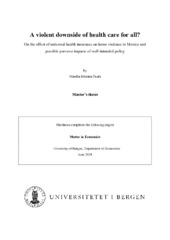| dc.description.abstract | The launch of the health insurance program Seguro Popular (SP) enabled all Mexican residents lacking employer-based coverage to enroll, for the very most part without any copayments necessary. This paper aims to evaluate whether this well-intended policy may have perverse impacts affecting household dynamics. More specifically, I will assess whether SP had any effects on the occurrence of home violence, opposing predictions from a bargaining power approach with those of the theory of male backlash. The gradual, quasi-exogenous rollout of SP on a municipality level makes implementing a difference-in-differences (DD) estimation strategy feasible, controlling for municipality-specific and time fixed effects (FE). This is done in practice by combining data containing information about families affiliated with SP with hospital discharge data including details on victims of home violence that sought medical attention at hospitals available from 2000-2012. Main regression results indicate that SP lead to small, but significant increases in home violence in line with a male backlash approach. Short-term effects for up to two years after SP introduction imply 0.05 additional incidents of home violence per municipality on average whereas estimated long-term effects (more than three years after introduction) are double in size. The results are robust to alternative specifications which suggests the absence of confounding factors. Interestingly, impacts are driven by the rich municipalities in Mexico. To understand underlying mechanisms, a complementary analysis on marriage and divorce rates was conducted. Results reflect a heightened degree of female empowerment and independence which supports the increasing impact of SP on domestic violence within a male backlash framework. To make sure that the detected effect on the occurrence of violence is not simply due to increased usage of medical services typically occurring when health care is provided freely, survey data from before, whilst and after SP rollout is analyzed. Corresponding results point to increases in home violence in rich municipalities, which is reconfirming the validity of the main results. For analysis, the statistical software package STATA/SE 16.0 was used. | en_US |
